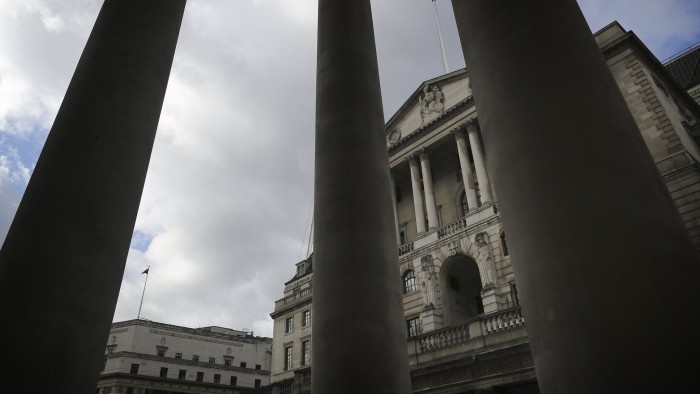Election jitters prompt exodus from Britain’s gilt market

Roula Khalaf, Editor of the FT, selects her favourite stories in this weekly newsletter.
Election jitters have led international investors to sell out of Britain’s bond market as the question of how the UK will tackle its debt burden casts a shadow over the next parliament.
With only three weeks until the general election and no political party expected to win an overall majority, an air of insecurity is hanging over sterling assets.
Figures from the Bank of England show that international investors have reduced their holdings of gilts by more than £14bn since the start of 2014, while their share of the market is at its lowest since the financial crisis.
“The election is the biggest issue for gilts now,” said Kerr Finlayson, director of debt syndicate at RBC Capital Markets. “And for investors there are huge question marks about what the outcome will be and what effect it will have on the way the country is run.”
Even after five years of spending cuts, Britain’s public finances are a source of concern. Public sector debt is expected to equal more than 80 per cent of national income this fiscal year compared with 35 per cent a decade ago, according to figures from the Office for Budget Responsibility.
The budget deficit — the difference between tax income and government spending — has halved during this parliament, but at more than 5 per cent of national income, is still among the highest in the EU.
All the big parties at Westminster are committed to shrinking the deficit, with the Conservatives targeting a fiscal surplus by 2020 and Labour and the Liberal Democrats promising to balance the books net of investment spending.
But some economists have questioned the feasibility of these plans, with the International Monetary Fund giving warning on Wednesday that the UK’s books will still be in the red by the end of the next parliament.
Moreover, some investors appear concerned about the effect that a messy election result will have on the public finances. “Investors don’t like uncertainty,” said RBC’s Mr Finlayson. “And there are concerns about the extent to which any political party will have the power to tackle the deficit in a meaningful way if there is a hung parliament.”

Meanwhile, the current account deficit hit 5.5 per cent in 2014, the highest yearly level since the war. This makes the British economy dependent on external financing and hence vulnerable to the risk of capital flight.
Despite these concerns, the gilt market has registered minimal upset. Volatility in 10-year gilts has increased and prices have fallen in the past month, but the UK’s benchmark borrowing cost remains just 25 basis points shy of its all-time low of 1.33 per cent.
A strong domestic base of pension and insurance fund buyers, together with expectations that the BoE will keep interest rates at a record low on the back of falling inflation, and spillover from the European Central Bank’s €60bn-a-month bond-buying programme are all underpinning the gilt market, helping it to maintain stability.
“There are big problems from the twin [budget and current account] deficit,” said Daniel Vernazza, an economist at UniCredit. “But it seems as if investors don’t care much about the domestic situation because the UK is still regarded as a haven.”
The British economy also looks relatively healthy compared with many of its peers. Last year, the UK economy grew at 2.8 per cent, faster than any country in the Group of Seven leading nations. Unemployment has fallen sharply, reaching 5.7 per cent, and real wages have begun to pick up after a prolonged period of stagnation.
While momentum in all sectors appears to have slowed at the start of this year, most economists still expect Britain to expand 0.4 per cent in the first quarter.

Those who issued dire warnings about a messy end to the gilt rally have been wrongfooted in the past, said Thomas Sartain, fixed income fund manager at Schroders, the UK fund management group.
Before the UK’s previous election in 2010 Bill Gross of Pimco dubbed Britain’s bonds “nitroglycerine” and declared that the country’s high level of debt should warn investors off. Yet the gilt rally continued.
“Public finances in the UK are not a pretty sight. But that doesn’t mean we’re seeing a wholesale desertion of the gilt market,” said Mr Sartain. “Gilts may not look attractive, but if you think that European government bond yields are negative, they at least offer a positive yield.”
There is also evidence to suggest that domestic elections have limited impact on UK government bond prices. Capital Economics notes that during the past two decades, gilt yields have moved less than 10 basis points the day following an election.
“Maybe we are complacent,” said Mr Sartain. “But it doesn’t seem as though the biggest risk is debt levels or the election. The real risk is that markets are underestimating how well the country is doing. If the first interest rate hike comes before next year, that would be the real surprise.”
. . .
Letter in response to this report:
Italy bids to beat unruly coalitions with ballot plan / From Gianluca Di Lorenzo
Comments